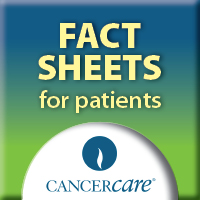You do not need to cope with multiple myeloma on your own. Your friends and family are important sources of strength and support, but you may also need help from specialty organizations and medical professionals. There are many local and national support services available to assist you.
Here are some kinds of resources that are available to you:
Treatment and medical information Your health care team is made up of doctors, nurses, and social workers who can provide information about treatment, related medical conditions, pain and side-effect management, and other concerns. Discharge planning coordinators at hospitals can provide you with resources for general and medical information. Public libraries and libraries at cancer centers are also sources of medical and coping information. Ask the librarian to help you find books or articles about your concerns.
Emotional support Being diagnosed with multiple myeloma can make you feel alone, anxious, or scared. Individual counseling, support groups, patient-to-patient networks and other types of support are available to help you cope with these emotions. Organizations like CancerCare offer free counseling and support groups led by professional oncology social workers.
Financial assistance It can be difficult to manage the cost of cancer treatment. Some organizations provide people with cancer help with medical billing, insurance coverage, and reimbursement issues. Organizations such as The Leukemia and Lymphoma Society www.leukemia-lymphoma.org provide financial assistance to help people who cannot afford the cost of medications and co-payments. Local and county government agencies can give you information on Social Security, state disability, Medicaid, income maintenance, LIHEAP (a low-income heating/energy program) and food stamps.
Practical assistance People affected by multiple myeloma may feel overwhelmed by day-to-day concerns like childcare or transportation. There are many different organizations that can help you. Some organizations provide services for children when a parent or grandparent is diagnosed with cancer. Others provide temporary lodging for families of a patient undergoing treatment if the patient needs to travel far from their home to receive treatment.
In many communities, transportation services are available to help people who have trouble getting to medical appointments during and after treatment. Local and county governments may offer low-cost transportation. Local churches, synagogues, YMCA, YWCA or fraternal orders may provide volunteers for transportation or home care.
CancerCare‘s “Door to Door” program for people coping with multiple myeloma provides individual grants to patients for covering transportation costs such as gasoline, taxi service, and public transportation fare to and from medical appointments.
You can also contact these agencies to learn what resources are available in your community:
The American Cancer Society
1-800-227-2345
www.cancer.org)
Area Agencies on Aging
1-202-871-0888
www.n4a.gov)
United Way
(http://liveunited.org).

